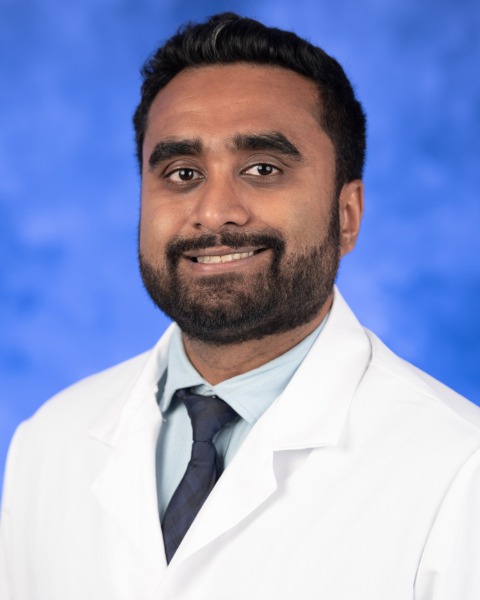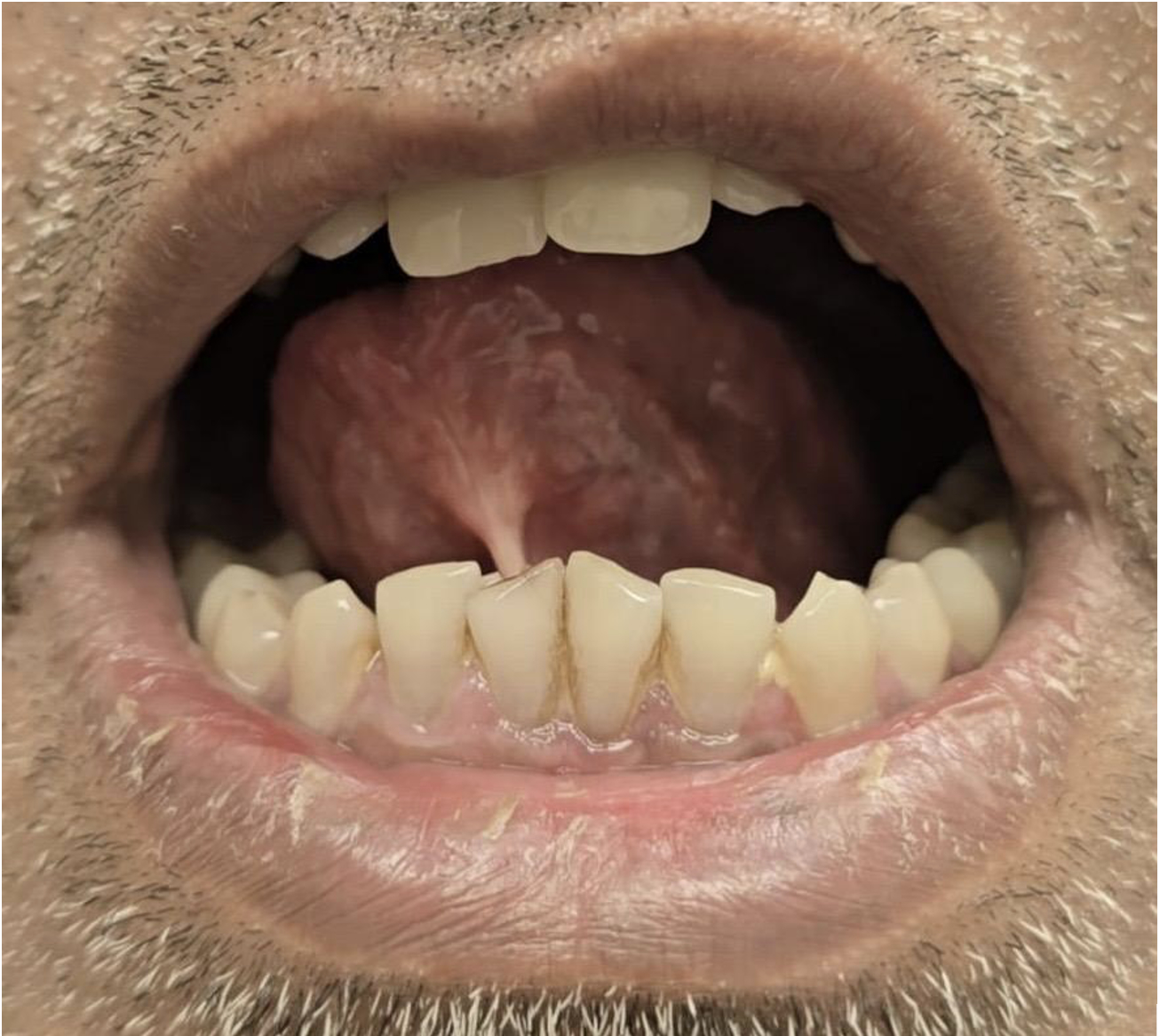Sunday Poster Session
Category: General Endoscopy
P0886 - Tongue-Tied and Failed Scopes: Ankyloglossia as an Unexpected Barrier to Upper Endoscopy
Sunday, October 26, 2025
3:30 PM - 7:00 PM PDT
Location: Exhibit Hall

Theja V. Channapragada, DO, MBA, MS (he/him/his)
Penn State Health Milton S. Hershey Medical Center
Hershey, PA
Presenting Author(s)
Theja V. Channapragada, DO, MBA, MS1, Aishwarya Kodoth, MBBS2, C.S. Pitchumoni, MD, MACG, MPH3, Srinivas Channapragada, MD3
1Penn State Health Milton S. Hershey Medical Center, Hershey, PA; 2A.J. Institute of Medical Sciences and Research Centre, Mangalore, Karnataka, India; 3Saint Peter's University Hospital / Rutgers Robert Wood Johnson Medical School, New Brunswick, NJ
Introduction: Ankyloglossia, or tongue-tie, is a congenital condition characterized by a restrictive lingual frenulum, with a reported prevalence of approximately 0.1% in adults. Often diagnosed in childhood, unless repaired surgically, ankyloglossia may persist during adulthood and contribute to subtle orofacial dysfunction, dysphagia, gastroesophageal reflux (GERD), or even obstructive sleep apnea. This case highlights a potential difficulty in performing a routine esophagogastroduodenoscopy (EGD) in an adult patient with ankyloglossia.
Case Description/
Methods: A 50-year-old South Asian male with a history of GERD and iron deficiency anemia underwent an EGD at a community endoscopy center. The procedure was technically challenging and had to be aborted early due to the patient having an unexpectedly narrow oropharyngeal space, which interfered with both scope advancement and airway management. Further evaluation identified ankyloglossia as a contributing factor (See Figure 1). A repeat EGD was scheduled at a tertiary care center under general anesthesia; however, the patient developed respiratory distress with desaturation, necessitating a difficult intubation. The patient was stabilized without further intervention and was advised to have all future endoscopic procedures performed at tertiary care centers under general anesthesia.
Discussion: Based on our exhaustive literature search, this is the initial report associating ankyloglossia with difficult oropharyngeal intubation during EGD. This case emphasizes the importance of recognizing subtle orofacial anomalies in adult patients. Obtaining a comprehensive clinical history is crucial, particularly for early life signs such as infant feeding difficulties, speech delays, trouble chewing or swallowing, and childhood symptoms of GERD. These subtle indicators, although frequently overlooked, can persist into adulthood and increase patients' susceptibility to complications during procedures. Our patient did not recall experiencing any of these symptoms during childhood, except for the development of GERD later in his life. A simple physical examination, evaluating tongue protrusion and elevation, can reveal lingual restriction. Patients with ankyloglossia should undergo endoscopy procedures at a tertiary care center under general anaesthesia to ensure safe airway management and procedural success. Incorporating basic oral motor assessments into pre-procedural evaluations may prevent complications, reduce procedural delays, and optimize patients' safety.

Figure: Figure 1: Our patient with ankyloglossia and reduced oropharyngeal space
Disclosures:
Theja Channapragada indicated no relevant financial relationships.
Aishwarya Kodoth indicated no relevant financial relationships.
C.S. Pitchumoni indicated no relevant financial relationships.
Srinivas Channapragada indicated no relevant financial relationships.
Theja V. Channapragada, DO, MBA, MS1, Aishwarya Kodoth, MBBS2, C.S. Pitchumoni, MD, MACG, MPH3, Srinivas Channapragada, MD3. P0886 - Tongue-Tied and Failed Scopes: Ankyloglossia as an Unexpected Barrier to Upper Endoscopy, ACG 2025 Annual Scientific Meeting Abstracts. Phoenix, AZ: American College of Gastroenterology.
1Penn State Health Milton S. Hershey Medical Center, Hershey, PA; 2A.J. Institute of Medical Sciences and Research Centre, Mangalore, Karnataka, India; 3Saint Peter's University Hospital / Rutgers Robert Wood Johnson Medical School, New Brunswick, NJ
Introduction: Ankyloglossia, or tongue-tie, is a congenital condition characterized by a restrictive lingual frenulum, with a reported prevalence of approximately 0.1% in adults. Often diagnosed in childhood, unless repaired surgically, ankyloglossia may persist during adulthood and contribute to subtle orofacial dysfunction, dysphagia, gastroesophageal reflux (GERD), or even obstructive sleep apnea. This case highlights a potential difficulty in performing a routine esophagogastroduodenoscopy (EGD) in an adult patient with ankyloglossia.
Case Description/
Methods: A 50-year-old South Asian male with a history of GERD and iron deficiency anemia underwent an EGD at a community endoscopy center. The procedure was technically challenging and had to be aborted early due to the patient having an unexpectedly narrow oropharyngeal space, which interfered with both scope advancement and airway management. Further evaluation identified ankyloglossia as a contributing factor (See Figure 1). A repeat EGD was scheduled at a tertiary care center under general anesthesia; however, the patient developed respiratory distress with desaturation, necessitating a difficult intubation. The patient was stabilized without further intervention and was advised to have all future endoscopic procedures performed at tertiary care centers under general anesthesia.
Discussion: Based on our exhaustive literature search, this is the initial report associating ankyloglossia with difficult oropharyngeal intubation during EGD. This case emphasizes the importance of recognizing subtle orofacial anomalies in adult patients. Obtaining a comprehensive clinical history is crucial, particularly for early life signs such as infant feeding difficulties, speech delays, trouble chewing or swallowing, and childhood symptoms of GERD. These subtle indicators, although frequently overlooked, can persist into adulthood and increase patients' susceptibility to complications during procedures. Our patient did not recall experiencing any of these symptoms during childhood, except for the development of GERD later in his life. A simple physical examination, evaluating tongue protrusion and elevation, can reveal lingual restriction. Patients with ankyloglossia should undergo endoscopy procedures at a tertiary care center under general anaesthesia to ensure safe airway management and procedural success. Incorporating basic oral motor assessments into pre-procedural evaluations may prevent complications, reduce procedural delays, and optimize patients' safety.

Figure: Figure 1: Our patient with ankyloglossia and reduced oropharyngeal space
Disclosures:
Theja Channapragada indicated no relevant financial relationships.
Aishwarya Kodoth indicated no relevant financial relationships.
C.S. Pitchumoni indicated no relevant financial relationships.
Srinivas Channapragada indicated no relevant financial relationships.
Theja V. Channapragada, DO, MBA, MS1, Aishwarya Kodoth, MBBS2, C.S. Pitchumoni, MD, MACG, MPH3, Srinivas Channapragada, MD3. P0886 - Tongue-Tied and Failed Scopes: Ankyloglossia as an Unexpected Barrier to Upper Endoscopy, ACG 2025 Annual Scientific Meeting Abstracts. Phoenix, AZ: American College of Gastroenterology.
